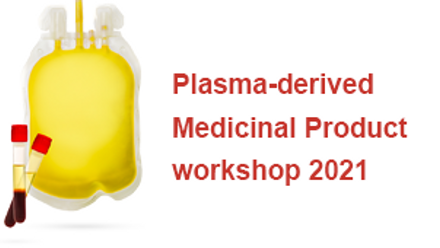Scope and Purpose
The workshop identified pragmatic technical options for stepwise access to safe plasma protein therapies in resource-constrained countries to support the implementation of the recent WHO guidance on “Increasing Supplies of Plasma-derived Medicinal Products in Low- and Middle-income Countries through Fractionation of Domestic Plasma” and “Centralization of Blood Donation Testing and Processing.”
Programme of the Workshop
Day 1. Tuesday September 21, 2021
13:00 - 13:10 Introduction
Introduction and housekeeping issues: Martin Smid (The Netherlands, Chair of the ISBT Global Blood Safety Working Party)
Welcome from ISBT: Erica Wood (Australia, ISBT President)
13:10 - 14:05 Unmet Needs for Plasma-derived Medicinal Products in Low- and Middle-income Countries
Moderators: Jean-Claude Faber (Luxembourg – ISBT WP GBS) and Cesar Garrido (Venezuela - WFH)
13:10-13:30 Coagulation factors (FVIII, VWF, FIX, PCC, fibrinogen, others) - Saliou Diop (Senegal, WFH)
13:30-13:50 Immunoglobulins (polyvalent) - Johan Prévot (Belgium, IPOPI)
13:50-14:05 Discussion/Q&A
14:05 - 16:00 Options for fractionation of domestic plasma
Moderators: Thierry Burnouf (Taiwan, ISBT GBS WP) and Junping Yu (Geneva, WHO)
14:05-14:25 Wastage of plasma in LMIC - Yuyun Maryuningsih (Geneva, WHO)
14:25-14:45 Key steps to improve quality of plasma for further processing - Vee Armstrong (Australia)
14:45-15:05 Plasma fractionation technologies: benefits and limitations; technical issues - Jan Bult (The Netherlands, PPTA)
15:05-15:25 Oversight of contract plasma fractionation - Françoise Rossi (France, IPFA)
15:25-15:45 Country experiences: Thailand - Narin Kijkriengkraikul (Thai Red Cross), Argentina - Andrea Corina Zucchi (UNC)
15:45-16:00 Discussion/Q&A
Day 2. Wednesday September 22, 2021
13:00 - 16:00 Options to improve the access to safe plasma protein products in LMIC
Moderators: Jean-Claude Faber (Luxembourg, ISBT GBS WP) and Jay Epstein (USA, ISBT GBS WP)
13:00-13:20 Recruitment and retention of safe Donors Giuliano Grazzini (Italy, FIODS)
13:20-13:40 Quarantine of plasma as a means to reduce the risk of transfusion-transmitted infection: logistics and feasibility Pierre Tiberghien (France, EFS)
13:40-15:20 Technologies for pathogen reduction (PR) of single-donor or mini-pools of plasma, cryoprecipitate, and immunoglobulins: experience from suppliers and users:
- Strategies to move safe plasma products into low resource areas: overview and experience with Riboflavin/UV Jeffrey McCullough (USA)
- Psoralen/UVA Hans Vermeij (Brazil, Cerus)
- Methylene blue/light Stefan Reichenberg (Germany, Macopharma)
- Pathogen reduction of COVID-19 convalescent plasma Salwa Hindawi (Saudi Arabia, King Abdulaziz University)
- Mini-pool solvent/detergent of plasma, cryoprecipitate & caprylic acid fractionation of immunoglobulins (VIPS) Magdy El-Ekiaby (Egypt, Shabrawishi Hospital)
15:20-15:40 Viral safety of plasma derived components Johannes Bluemel (Germany, PEI)
15:40-16:00 Discussion/Q&A
Day 3. Thursday September 23, 2021
13:00 - 15:00 Scale-up for domestic processing of plasma: technology options, equipment and oversight
Moderators: Micha Nuebling (Germany, WHO/PEI) and Thierry Burnouf (Taiwan, ISBT GBS WP)
13:00-13:15 Potential contribution of single-use technologies for processing domestic plasma components Prity Bengani-Lutz (USA, Sartorius)
13:15-13:30 Domestic scalable plasma processing: technological approaches and solutions for LMIC Josephine Cheng (Taiwan, Merck Millipore) and Jian-Fei Shou (China, Merck Millipore)
13:30-13:45 Potential contribution of nanofiltration to the virus safety of domestic plasma components Tomoko Hongo-Hirasaki (Japan, Asahi Kasei Medical)
13:45-14:00 SARS-CoV-2 immunoglobulins in India as an example for domestic production of immunoglobulins: Safety, efficacy and quality attributes Suma Ray (India, Intas Pharmaceuticals)
14:00-14:20 Plasma fractionation of animal-derived immunoglobulins in LMIC: lessons to be learned for human plasma IgG production Mariángela Vargas (Costa Rica, Instituto Clodomiro Picado)
14:20-14:40 Regulatory considerations for authorization of plasma processing devices: example of an EU CE marking Mohamed Ghonim (Switzerland, QSE Consulting)
14:40-15:00 Discussion/Q&A
15:00 - 16:00 The Way Forward
Moderators: Martin Smid (The Netherlands, ISBT GBS WP) and Jay Epstein (USA, ISBT GBS WP)
15:00-15:20 Models for technology transfer and technical assistance Leni von Bonsdorff (Finland, IPFA)
15:20-16:00 Panel discussion: Lessons learned and next steps Yuyun Maryuningsih (WHO), Giuliano Grazzini (FIODS), Cesar Garrido (WFH), Saliou Diop (WFH), Johan Prevot (IPOPI), Johannes Bluemel (PEI), Leni von Bonsdorff, (IPFA), Jan Bult (PPTA)
16:00 Closure of the workshop
Workshop Handbook

